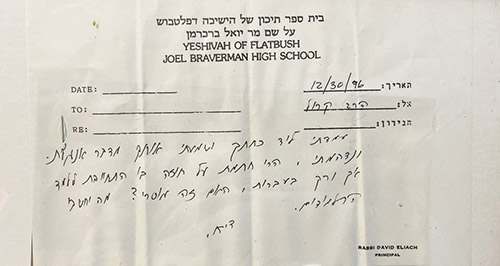
The note was written on an unusually sized piece of paper. About 6 inches wide and 4 inches long, it was folded in half and stapled shut. I began teaching at Yeshivah of Flatbush in September 1996, just a few months after finishing semicha and graduate school at Yeshiva University. Rabbi David Eliach, the principal, was a revered presence, but I had been warned by veteran teachers to avoid getting a stapled note from him. On December 30, 1996, a colleague nervously approached me and said that she thought that a stapled note had just been placed in my box. Anxiously, I walked to the box, ripped open the note and read its contents, which were written in Hebrew:
Rabbi Kroll, I stood outside of your class and heard you speaking English. And I was shocked. You signed a contract in which you committed to teaching exclusively in Hebrew. Is this ethical? What will the students think?
My stomach sank. With palms sweaty and shoulders heavy, I walked out of the office to search for Rabbi Eliach and apologize for my transgression. I found him in the lobby and stammered through an apology in Hebrew: “I’m sorry, Rabbi Eliach. The students didn’t understand what I was trying to say when I was speaking in Hebrew. So I just switched to English for two sentences until they understood, and then I switched back to Hebrew. It won’t happen again.”
Rabbi Eliach looked at me, smiled, put his hand on my shoulder and with a little laugh, said in Hebrew, “Take that note, frame it and hang it on a wall. It’s the last note I’ll be writing.” Indeed, Rabbi Eliach retired from his storied career as principal of Yeshivah of Flatbush High School the next day.
Rabbi Eliach served as my principal for only half of the first of my seven years at Flatbush, but he continued as a mentor for the rest of my time there, coming to work almost every day after his retirement. I took his advice and framed the note. Twenty-five years later it hangs in my office at SAR High School. I see it every day. His passing last week feels like the end of an era. He was a larger-than-life educator who taught teachers and students through both instruction and deed. By asking me to frame and hang that note, I think that Rabbi Eliach conveyed a number of important lessons about chinuch that I try to live up to.
The centrality of Ivrit. Understanding, reading, speaking and thinking in Hebrew helps craft a key that unlocks so many doors of Jewish learning and identity. The Rambam even suggests that learning Hebrew is a mitzvah d’oraita. The mishna in Pirkei Avot (2:1) tells us to be careful about the performance of light mitzvot as well as weighty mitzvot. The Rambam explains that light mitzvot refers to things like rejoicing on Yom Tov and learning Hebrew. Simchat Yom Tov is a biblical mitzvah and, it would seem according to the Rambam, learning Hebrew is too. Of course some students connect to Torah better when taught in English, but so many students and adults alike enrich their Jewish identity and learning by being able to participate in a shiur taught in Hebrew; they are also better equipped to engage meaningfully with Jewish texts when their Ivrit has been given central importance.
Maintaining standards of excellence. It was his last formal day of work as principal. He could have spent the day cleaning out his office or saying goodbye to colleagues. Instead, Rabbi Eliach spent that day doing what he always did: mentoring his staff and holding us to high standards. I was inspired by his professionalism and motivated by his holding me accountable. I also realized that when you hold the bar high, people understand the goal; even when they don’t meet that standard, they end up better than they would have been had the bar been placed at a more reasonable level.
It’s all about the students. When Rabbi Eliach asked rhetorically in his note, “what will the students think?” he conveyed that education isn’t just about whether the teacher teaches the curriculum and whether the students know the material. What will the students think of their teacher and their learning experience? What am I doing in my classroom to ensure that the students are treated with the respect that they deserve?
The role of an educational leader. Rabbi Eliach wanted his teachers to inspire their students to learn Torah at high levels. He knew that he was revered by us, and he knew that a rookie teacher would be especially frightened receiving that note. When he smiled at me and put his hand on my shoulder, I got the message: take your job seriously, but don’t take yourself too seriously. To inspire others to become the best versions of themselves, help guide them the best you can, but do so with good humor, with kindness and without an ego.
Rabbi Eliach, I only had the privilege to work for you for a short time. I am grateful for the opportunity to be connected to you and what feels like a foundational era in Jewish education. I will try to pass on the lessons I learned from you, especially as people who enter my office see that framed note recall that today’s Jewish educators stand on the shoulders of giants.
Rabbi Kroll, a founding staff member at SAR High School, returned in 2019 as principal after spending six years as the head of school at Katz Yeshiva High School of South Florida. He received his B.A. from Yeshiva College and his semicha from Rabbi Isaac Elchanan Theological Seminary and a master’s degree in secondary education from the Azrieli Graduate School. Before the founding of SAR High School, Rabbi Kroll began his career in Jewish education, teaching at Yeshivah of Flatbush.













